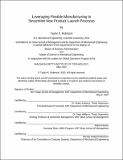| dc.contributor.advisor | Brian Anthony and Sean Willems. | en_US |
| dc.contributor.author | Robinson, Taylor K.(Taylor Kristyn) | en_US |
| dc.contributor.other | Sloan School of Management. | en_US |
| dc.contributor.other | Massachusetts Institute of Technology. Department of Mechanical Engineering. | en_US |
| dc.contributor.other | Leaders for Global Operations Program. | en_US |
| dc.date.accessioned | 2020-09-03T15:54:02Z | |
| dc.date.available | 2020-09-03T15:54:02Z | |
| dc.date.copyright | 2020 | en_US |
| dc.date.issued | 2020 | en_US |
| dc.identifier.uri | https://hdl.handle.net/1721.1/126916 | |
| dc.description | Thesis: M.B.A., Massachusetts Institute of Technology, Sloan School of Management, in conjunction with the Leaders for Global Operations Program at MIT, May, 2020 | en_US |
| dc.description | Thesis: S.M., Massachusetts Institute of Technology, Department of Mechanical Engineering, in conjunction with the Leaders for Global Operations Program at MIT, May, 2020 | en_US |
| dc.description | Cataloged from the official PDF of thesis. | en_US |
| dc.description | Includes bibliographical references (pages 65-66). | en_US |
| dc.description.abstract | Johnson & Johnson Vision (JJV), manufacturer of the ACUVUE® Brand Contact Lenses, is committed to launching new contact lens products every year to maintain competitive edge and long-term relevancy. However, manufacturing lines currently operate at high utilization rates to satisfy steadily growing demand, limiting opportunity to beta test new products or validate manufacturing lines. Beta testing provides feedback on product design and manufacturability while validation qualifies a line to make a particular product at commercial scale - contributing to the more than 5 billion contact lenses produced by JJV yearly. To build manufacturing capacity and introduce flexibility into the system, JJV built the Flexible Manufacturing Platform (FMP). FMP is a modular manufacturing line capable of producing any contact lens in the JJV portfolio. This thesis explores how to strategically leverage FMP to enable quicker transitions from pilot-line production to commercial-scale production. | en_US |
| dc.description.abstract | A case study was performed on the FMP heat seal manufacturing process step, providing insight into both the technical capability and organizational processes of FMP. The heat seal was chosen due to its critical importance in maintaining product quality and patient safety. Prior to the start of this project, the heat seal process step lacked consistency and reliability. Statistical process control techniques were employed to generate a heat seal capability model that measured the effect of changing the contact time, contact temperature, and contact pressure. This revealed contact time and contact temperature to have the most influence on heat seal integrity. The capability model ultimately improved decision quality and reduced product failures by 80%. Successful execution of the case study also required observation of upstream and downstream process steps to the heat seal, yielding a thorough understanding of the entire FMP line. | en_US |
| dc.description.abstract | This FMP current state analysis shows the remaining work needed to efficiently scale between pilot-line production and commercial-scale production. As such, there is a need for continuous knowledge transfer between the R&D and Operations teams as they develop new governance processes to merge into a single domain. In doing so, FMP can become an efficient structure to continuously launch new products. | en_US |
| dc.description.statementofresponsibility | by Taylor K. Robinson. | en_US |
| dc.format.extent | 66 pages | en_US |
| dc.language.iso | eng | en_US |
| dc.publisher | Massachusetts Institute of Technology | en_US |
| dc.rights | MIT theses may be protected by copyright. Please reuse MIT thesis content according to the MIT Libraries Permissions Policy, which is available through the URL provided. | en_US |
| dc.rights.uri | http://dspace.mit.edu/handle/1721.1/7582 | en_US |
| dc.subject | Sloan School of Management. | en_US |
| dc.subject | Mechanical Engineering. | en_US |
| dc.subject | Leaders for Global Operations Program. | en_US |
| dc.title | Leveraging flexible manufacturing to streamline new product launch processes | en_US |
| dc.type | Thesis | en_US |
| dc.description.degree | M.B.A. | en_US |
| dc.description.degree | S.M. | en_US |
| dc.contributor.department | Sloan School of Management | en_US |
| dc.contributor.department | Massachusetts Institute of Technology. Department of Mechanical Engineering | en_US |
| dc.contributor.department | Leaders for Global Operations Program | en_US |
| dc.identifier.oclc | 1191624105 | en_US |
| dc.description.collection | M.B.A. Massachusetts Institute of Technology, Sloan School of Management | en_US |
| dc.description.collection | S.M. Massachusetts Institute of Technology, Department of Mechanical Engineering | en_US |
| dspace.imported | 2020-09-03T15:54:02Z | en_US |
| mit.thesis.degree | Master | en_US |
| mit.thesis.department | Sloan | en_US |
| mit.thesis.department | MechE | en_US |
